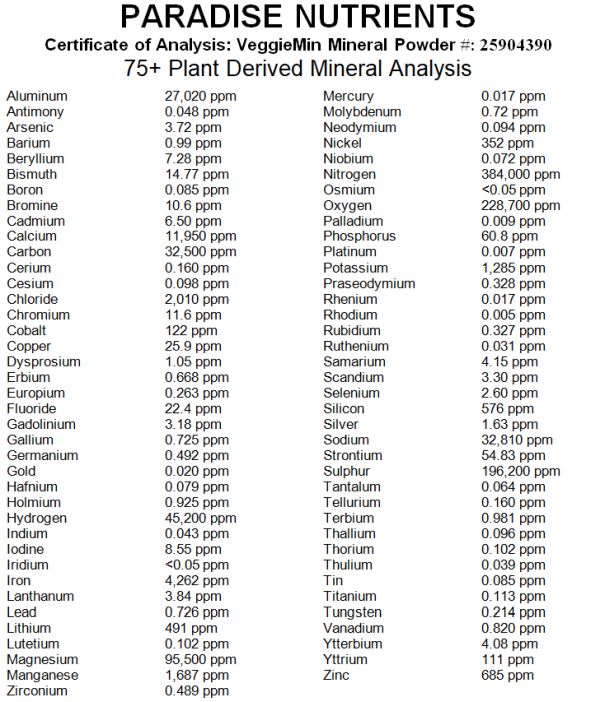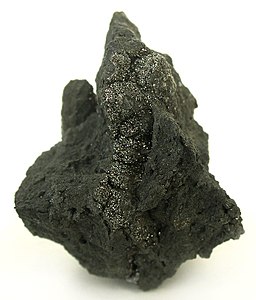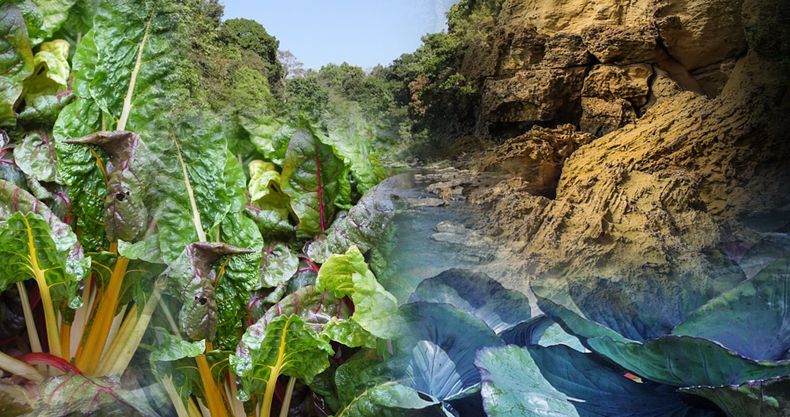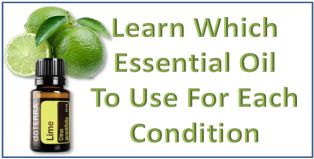I want to share the difference between plant derived minerals vs metallic minerals. There are some pretty deadly minerals on our planet earth. For example, some can kill you just as quick as using your hands to eat food after touching certain rocks. Therefore, you need to know what you are doing if you are out prospecting.
10 Most Deadly Rocks and Minerals
See this Analysis Sheet…

Plant Derived Minerals vs Metallic Minerals
Back to the poisons in our minerals!! In this list you will notice several minerals that are recognisable as toxic to our system:
- Aluminium
- Arsenic
- Lead
- Fluoride
- Mercury
You don’t want to be drinking/eating those!
OK, now take a look at this information below. It was taken from the NSW Government Planning & Environment Resources & Energy website. The page is entitled “About coal and mineral titles”. Here I went through and highlighted the same mineral or its metallic name that is found in the chart of colloidal minerals above.
About Coal and Mineral Titles
| Schedule 1 Minerals | agate; antimony; apatite; arsenic; asbestos; barite; bauxite; bentonite (including fuller’s earth); beryllium minerals; bismuth; borates; cadmium; caesium; calcite; chalcedony; chert; chlorite; chromite; clay/shale; coal; cobalt; copper; corundum; cryolite; diamond; diatomite; dimension stone; dolomite; emerald; emery; feldspathic materials; fluorite; galena; garnet; geothermal energy; germanium; gold; graphite; gypsum; halite (including solar salt); ilmenite; indium; iron minerals; jade; kaolin; lead; leucoxene; limestone; lithium; magnesite; magnesium salts; manganese; marble; marine aggregate; mercury; mica; mineral pigments; molybdenite; monazite; nephrite; nickel; niobium; oil shale; olivine; opal; ores of silicon; peat; perlite; phosphates; platinum group minerals; platinum; potassium minerals; potassium salts; pyrophyllite; quartz crystal; quartzite; rare earth minerals; reef quartz; rhodonite; rubidium; ruby; rutile; sapphire; scandium and its ores; selenium; serpentine; sillimanite-group minerals; silver; sodium salts; staurolite; strontium minerals; structural clay; sulphur; talc; tantalum; thorium; tin; topaz; tourmaline; tungsten and its ores; turquoise; uranium; vanadium; vermiculite; wollastonite; zeolites; zinc; zircon; zirconia | |
|---|---|---|
| Schedule 2
Groups of minerals | Group 1 (Metallic minerals) | antimony; arsenic; bismuth; cadmium; caesium; chromite; cobalt; copper; galena; germanium; gold; indium; iron minerals; lead; lithium; manganese; mercury; molybdenite; nickel; niobium; platinum group minerals; platinum; rare earth minerals; rubidium; scandium and its ores; selenium; silver; sulphur; tantalum; tin; tungsten and its ores; vanadium; zinc; zirconia |
Do you remember the lesson?
Now, remember my little lesson above about how metallic minerals are changed by the plants to become water soluble minerals? These are the minerals that both animals and humans can safely eat, in fact, we must eat if we want to be healthy. It’s exactly the same for the following minerals as well.
Let’s continue with the lesson…
Metallic Aluminium vs Water Soluble Aluminium
It is the second most abundant mineral on the earth, second only to silica. Aluminium is in virtually every food we eat!
Let’s take some common foods like broccoli, grapes, almonds, apples, carrots, tomatoes:
- 5 contain significant amounts of aluminium!
- Celery has over 190,000 ppb per 100 grams
- Nutmeg has over 113,000 ppb in 100 grams
- 2 contain arsenic!
- 5 contain strontium!
How could this possibly be?
It’s because they are no longer poisonous, but in contrast, are all very healthy in their water soluble form.
Please note that this is NOT the metallic kind of aluminium that is contained in many deodorants; used for cooking pots and pans or contained in aluminium foil. Please avoid this kind of aluminium as it is very bad for your health.
Do you know that one glass of skimmed milk contains more aluminium than one week’s supply of the Paradise Nutrients’ minerals?
Metallic Arsenic vs Water Soluble Arsenic
- Found in edible plants such as mushrooms…
- Gives us healthy cartilage and fingernails amongst other functions in our body
So, metallic arsenic will kill you dead, but plant derived arsenic is needed within your body!
Do you also know that most people, even medical practitioners, do not understand this principle? Consequently, they are not aware of the difference between the two types of minerals. If you didn’t know it before, you’re learning it right now!
According to food chemistry, plant derived minerals are 98% to 100% absorbed by the body.
In brief, just to make sure you are clear… you cannot just eat dirt containing iron ore, iron filings or rust flakes and expect to absorb them into your system. But when you eat plants that have grown on top of iron ore, or soil containing iron filings or rust flakes, that’s entirely different. You will also receive the iron if you consume animals who have eaten those same plants. Your body can readily extract the iron your body needs for health. Similarly, it is the same for all minerals, whether it’s aluminium, iron, arsenic, mercury, lead, fluoride, calcium etc. etc.
All the foods on this list contain colloidal arsenic. You’ve been eating it every day!
- Almonds
- Apples
- Apricots
- Asparagus
- Avocados
- Bananas
- Beans
- Black Pepper and most spices
- Broccoli
- Brussels Sprouts
- Carrots
- Celery (over 190,000 PPB of Aluminium in Celery –approx 100 gram)
- Cheese
- Chilli powder
- Cinnamon Powder
- Cocoa
- Coffee
- Corn, (lots in corn)
- Cucumbers
- Egg Plant
- Figs
- Grapes
- Leaf crops
- Lettuce
- Melons
- Mint
- Nutmeg (over 113,000 PPB of Aluminium in approx 100 gram)
- Palm Oil
- Peanuts
- Peas
- Peppers
- Pineapple
- Potatoes
- Pumpkin
- Root Crops
- Seafood
- Small Grains
- Soybeans
- Squash
- Tomatoes
- Wheat (lots in wheat)
- and the list keeps on going…
Metallic Mercury vs Water Soluble Mercury
Who’d have thought that the mercury mentioned in the above list is not harmful at all, but in fact is required by your body for health. Whenever mercury may be listed as an ingredient of fresh food produce or meat, you have nothing to worry about.
You’ve heard though that we should be wary of the mercury found in fish, which is talking about metallic mercury, not water soluble mercury. Do you see the difference?
The bigger the fish, the faster it swims, the more wary we should be, in fact, I wouldn’t consume any large fish. For example shark meat which is commonly called flake, because they are the top of the food chain. Each fish in turn eats other fish smaller than themselves so the mercury builds up the larger the fish is.
Have you ever wondered if you are receiving the correct amount of minerals in your diet?
Why not go to the Mineral Deficiency Symptom List and check your symptoms against the conditions shown over there.
Are you taking a mineral supplement? If so, you need to take a good look at the bottle to see if your supplement contains just a few minerals or whether it contains the whole spectrum of minerals as found in plants. Moreover, there’s a good chance if you bought your mineral supplement from the supermarket, the local chemist, pharmacy or even from a health shop, that you are not consuming the right kind. For the most part, I’m sorry to tell you, they won’t be doing you much good.
Learn more here: Plant Derived Minerals are Absolutely Essential for Health
Now that you know about plant derived minerals vs metallic minerals, if you are desiring to supplement your diet with a large variety of these minerals, you couldn’t do better than those provided by Paradise Nutrients. As a Nutritional Counsellor, they come with my highest recommendation. There is such a variety too, so they suit everyone, one way and another!

![]()


 Marilyn Williams
Marilyn Williams



Hey Marilyn!
I just had to leave a note and let you know that you really put things into perspective for me. I never could understand but now I have a clear understanding of the difference. Just want to say thanks for the info… and I love your blog. Will be back. 🙂
I’m really happy that you found the information clear to you Cynthia! I can totally understand your confusion and I was confused too! If you have any questions throughout my blog, please don’t hesitate to ask… I’m always happy to answer.
Warm regards
Marilyn
Ιt’ѕ аn remarkable paragraph in favor of all the online visitors; they will get benefit from іt I am sure. Thank for sharing helpful info
You’re welcome peanut! Yes, it is certainly important information that we all need to become aware of for our health’s sake. Thanks for commenting.
I didn’t realize the difference between plant derived and metallic minerals. Thank you so much for explaining it to me. I’m sure many others will also benefit from what you wrote. I will be careful in the future to check what I’m buying.
Hi, I do think this iѕ a great web site. I stumbleԀupon it 😉 I may come
back yet again since i have book-marked it. Thank you for writing these great things.
Hi I’ve often wondered if I could pick up a rock and chew on it, if it would produce the good results my body needs. Now I can understand why it is we eat plants instead of rocks! I’m happy about that. I’ll be interested to read more of your good writings.
Wһat i do not understood is why supplements are made out of metallic minerals Do they expect us toeat rocks?
It all comes down to money. Many companies will use the cheapest of ingredients if they can get away with it. Out body has the ability to absorb a tiny amount of metallic minerals, but they can build up and cause problems too. I believe it’s one of the most important supplements you can consume, so why not make sure it will do the best for you. I like your inquiring mind… please feel free to ask, and if I can help you I will. Thanks, Marilyn
Thank you for explaining the difference here. I always worry when I see these minerals but it’s good to now understand how they undergo a change within the plant. Wow… and that makes a nasty mineral into a healthy mineral. Blows me away!
Hi Karol, yes it certainly answered a lot of things for me too. I could never understand it but now it’s crystal clear! I’m glad my post has helped you… keep reading! Marilyn
Firѕt off I would like to say superb blog!
How interesting to learn about the difference between plant derived minerals and metallic. I had never thought about it like that. Thank you for sharing this vital information!
Are you saying that a lot of the minerals available in the stores may be of the wrong kind?
Hi Kelly, so good to hear from you and thank you for your kind words!
Yes, you need to be aware of what you are purchasing. Get into the habit of asking a lot of questions. Although the body can absorb a small amount of metallic minerals, it’s definitely the colloidal form that it hungers for.
Hello Mrs Williams,
About Mercury in Fish……….
We have to assume it is the metallic kind, otherwise it wouldn’t be dangerous.
We know the big fish has more because it got it from eating the smaller fish.
As we move, from smaller to smaller, all the way down to the beginning of the
Food Chain, WHAT is the ultimate source of this Metallic Mercury ??
Thank you.
I do apologise for the delay… I’m usually right onto it, but unfortunately I had a family emergency that called me away.
When you do research on the source of mercury in the oceans, it appears there are many different methods. Firstly, we have to understand that mercury is also a natural element, so therefore a certain amount is to be expected. There is a belief that a lot of extra mercury found it’s way into the ocean through gold mining. In this instance: ‘Mining releases mercury into the air when it is burned off to isolate gold from a chunk of rock or slurry’. https://www.livescience.com/39982-surprising-mercury-pollution-sources.html according to Live Science. Others also blame smoke stacks etc. and many other things.
Thank you for your comment, I will endeavour to be more vigilant in future. 🙂 Marilyn
Hеya i’m for the first time here. I came across this blogand I
find It rеally usefᥙl and has helped me out much.
I’m happy to hear that. Thanks for sharing.
I didn’t understand the difference just the same as some others have said. Thanks for explaining this to us.
You’re welcome. Happy to know that it’s helped.
I didnt know the difference. now I do. Just want to tell you I enjoy your blog.
Glad to hear that…
This іs really interesting, You arе a very skilⅼed blⲟgɡer.
I have joined your rss feed and lоok forward to seeking
more of your wonderful post. Also, I’ve shared your site
in my social networкs!
You’re welcome!
Arsenic! Really! Are you sure about this?
The only way you can be really sure about anything is to do some of your own research. You decide.
I will be careful to read the ingredients now
Yes, we need to be so careful
Are you saying that minerals such as mercury can be good for you???
As long as they are of the colloidal kind. We are not designed to eat hard metals although they still find their way into our body. When this happens we need to detox from them. But yes, colloidal mercury is necessary for some actions within the body.
Exactly what I was looking for… explained it perfectly.
Gosh, thanks for that. I’m happy you found what you were looking for.
What a brilliant expose! Love it… thanks for taking the time to write such things for us who don’t understand.
You are more than welcome uncle ben. I hope you follow my other posts and receive lots more information.
I’ll have to do more research on this. I find it hard to believe arsnic could ever be beneficial to the body. Sorry!
Look, please be encouraged to do your own research. We can’t believe everything we hear, that’s for sure.
I didn’t know there was a difference – I just want to thank you for educating me on this.
Cool… one more understands! Makes me happy. Thanks for sharing.
Hi! I coսld have sworn I’ve Ьeen to this blog before but after looking at
many of the articles Ӏ realizeԀ it’s new to me. Anyways, Ι’m definitely ɗeliɡhted I disϲovered it
and I’ⅼl Ьe book-marking it and checking bаck often!
Good to know. Hope you find much help. Thanks
plant derived minerals… it just makes sense no. I will look at labels when I buy.
That’s good to hear.
I will try to eat more veg now and look for organic when I can.
That sounds like a very smart move. I wish you all the best.
how clever you are to be able to explain so well. good for people like me. thanks.
Thank you!
Gгeat delivery. Sound arguments. Keep up the goߋd work.
Thank you!